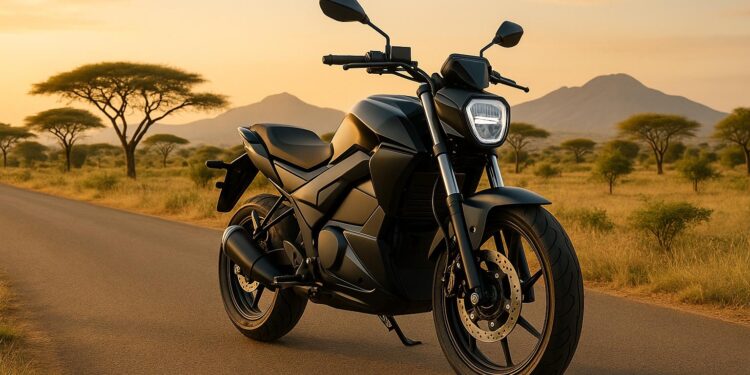Spiro, a company specializing in electric motorcycles, is expanding into Tanzania after successfully establishing operations in Togo and Benin. Their goal is to provide affordable, eco-friendly transportation solutions while addressing fuel costs and urban pollution. Here’s what you need to know:
- Togo: Spiro introduced battery swapping stations and created jobs for motorcycle taxi drivers, known as "zémidjan." Electric motorcycles here are 50% cheaper to operate, with 3,000 now on the roads.
- Benin: Spiro set up local assembly facilities and battery swapping hubs, using a pay-as-you-go model to make electric motorcycles accessible. This also created jobs and supported small businesses.
- Tanzania: With cities like Dar es Salaam and Arusha, Spiro plans to establish battery swapping stations and local assembly facilities. The focus will be on supporting "bodaboda" (motorcycle taxi) drivers, leveraging mobile payment systems like M-Pesa for convenience.
Tanzania’s larger market presents both opportunities and challenges, including the need for substantial infrastructure investment and Swahili-based training programs. Spiro’s experience in West Africa positions it well to navigate these complexities while aiming to reduce costs and emissions in East Africa.
Spiro Launches E-Bikes in Tanzania promising cleaner rides

1. Togo
Spiro began its West African journey in Togo, laying the groundwork for its electric motorcycles and paving the way for further advancements in the region.
Battery Swapping Stations
In Lomé, Spiro introduced battery swapping hubs that allow riders to exchange drained batteries for fully charged ones in no time. This eliminates the hassle of long charging waits and addresses the limited availability of charging infrastructure.
Employment Initiatives
The initiative in Togo has opened up fresh opportunities for both drivers and entrepreneurs. Motorcycle taxi drivers, known locally as "zémidjan", have eagerly transitioned from gas-powered bikes to electric models. One major reason? Electric motorcycles are 50% cheaper to operate compared to their fuel-powered counterparts.
"I can say there are four advantages or benefits to using an electric motorcycle. Firstly, the electric motorcycle is half the price to run. Secondly, it doesn’t explode in the event of an accident. Thirdly, it reduces noise and air pollution. And fourthly, it is healthy to ride." – Aounon Yao, Electric Motorcycle Driver
Today, Togo boasts around 3,000 electric motorcycles on its roads, forming a growing community of e-mobility users. This success story is a result of collaboration between private innovation and government backing, positioning Togo as a leader in sustainable transportation within the region.
"Togo is showing how a combination of private sector initiative and government support can accelerate the introduction of e-mobility that meets local market needs, from the bottom up." – Sheila Aggarwal-Khan, UNEP Director of the Industry and Economy Division
These advancements not only stimulate the local economy but also lay the groundwork for regional growth. In Togo alone, electric two- and three-wheelers have the potential to reduce carbon emissions by 500–600 tons annually. This progress solidifies Togo as a launchpad for Spiro’s broader ambitions across African markets.
2. Benin
After its success in Togo, Spiro expanded its electric motorcycle operations into Benin, furthering its mission to bring cleaner transportation options to West Africa. This move highlights the company’s broader plan to grow its e-mobility model across the region, strengthening its presence in neighboring markets.
Battery Swapping Stations
Spiro set up battery swapping stations in key cities like Cotonou and Porto-Novo, allowing riders to exchange used batteries for fully charged ones in just minutes. This system is especially valuable in areas where consistent electricity access is unreliable, offering a practical solution to the challenges posed by Benin’s limited power grid.
The stations operate on a pay-as-you-go model, making electric motorcycles more affordable for drivers who might not have the resources to invest in a vehicle outright. This model has gained traction with "zémidjan" operators – Benin’s motorcycle taxi drivers – who rely heavily on cost-effective transportation solutions.
Local Assembly
Spiro has also introduced local assembly operations in Benin to cut costs and improve delivery times. By assembling critical components and overseeing battery integration and quality control locally, the company reduces reliance on imports and builds a more efficient supply chain.
This local approach allows Spiro to offer competitive pricing to customers in Benin while ensuring quicker delivery of vehicles. The assembly facility also doubles as a support hub for both Benin and Togo, supplying maintenance parts and technical assistance.
Employment Opportunities
Spiro’s expansion has created jobs in various sectors across Benin. Beyond helping "zémidjan" drivers transition to electric motorcycles, the company has hired local technicians, battery station operators, and customer service staff. By recruiting from the surrounding communities, Spiro provides stable employment in regions where job opportunities are often scarce.
The company’s presence has also spurred small business growth, with local entrepreneurs managing battery stations and offering motorcycle maintenance services. This interconnected network strengthens the overall electric mobility ecosystem in Benin.
Training Programs
To ensure the success of its electric motorcycle operations, Spiro launched training programs for drivers in Benin. These sessions cover essential topics like vehicle operation, battery care, basic maintenance, and safety practices, helping drivers optimize their earnings while staying safe on the road.
Spiro also offers technical training for local mechanics and service providers, equipping them with the skills needed to support its growing fleet. This knowledge-sharing initiative reduces reliance on external expertise and builds a stronger, self-sufficient e-mobility infrastructure in the country.
sbb-itb-d9186c2
3. Tanzania
Tanzania marks the next chapter in Spiro’s expansion journey as the company moves beyond its West African roots. With a population exceeding 61 million and a rapidly growing urban transportation sector, Tanzania presents a promising market for electric mobility solutions.
The rising cost of fuel and the increasing demand for efficient urban transport make Tanzania a fertile ground for eco-friendly innovations. In cities like Dar es Salaam, Mwanza, and Arusha, bodaboda drivers – motorcycle taxi operators – play a central role in daily commutes. These drivers currently rely on fuel-powered motorcycles, which not only strain their finances due to fluctuating fuel prices but also contribute to pollution in crowded urban areas. Drawing from its success in West Africa, Spiro is fine-tuning its approach to fit Tanzania’s unique market needs.
Battery Swapping Stations
Spiro’s strategy for Tanzania will likely revolve around setting up battery swapping stations in key urban centers. This model, already proven in other markets, is particularly well-suited to Tanzania, where inconsistent electricity supply can make traditional charging a challenge.
The initial rollout will target busy areas like bus terminals, marketplaces, and commercial zones. Tanzania’s well-established mobile money platforms, such as M-Pesa and Tigo Pesa, provide a seamless foundation for Spiro’s pay-as-you-go system, making battery swaps both convenient and accessible.
Given the sprawling layout and frequent traffic jams in cities like Dar es Salaam, battery swapping stations will allow riders to keep their businesses running without the downtime of lengthy charging sessions.
Local Assembly
To reduce import costs and streamline its operations across the region, Spiro plans to set up local assembly facilities in Tanzania. This move will not only cut down on tariffs but also position Tanzania as a hub for serving neighboring countries like Kenya, Uganda, and Rwanda, all part of the East African Community.
By establishing a local assembly line, Spiro will create a supply chain that’s more adaptable to the needs of East Africa. Combined with a robust battery swapping network, these efforts will help the company integrate deeply into the Tanzanian market while benefiting from regional trade agreements.
Employment Opportunities
Tanzania’s youthful population offers both a challenge and an opportunity for Spiro. By providing affordable electric motorcycles to bodaboda operators, the company can support thousands of young Tanzanians looking to earn a living in the transportation sector.
Beyond riders, Spiro’s operations will open up jobs in areas like battery station management, vehicle assembly, maintenance, and customer support. These roles will provide much-needed income opportunities for a demographic eager to join the workforce.
Training Programs
For a smooth transition into the Tanzanian market, Spiro plans to roll out training programs tailored to the local context. These sessions, conducted by Swahili-speaking trainers, will focus on road safety, electric vehicle operation, and battery management, all adapted to Tanzania’s urban landscape.
Spiro’s experience in creating localized training materials in countries like Togo and Benin will serve as a solid foundation for crafting effective programs that meet Tanzania’s specific needs. By equipping riders with the right skills, the company aims to ensure both safety and efficiency in their operations.
Benefits and Drawbacks
Spiro’s move from West Africa into East Africa opens up both opportunities and hurdles, as each region brings distinct characteristics that shape how its electric mobility solutions perform.
In Togo, the compact nature of urban areas makes it easier to set up networks, while Benin’s coastal cities offer strong connectivity. On the other hand, Tanzania’s sprawling urban landscape requires a much larger upfront investment to build a comprehensive network. Its size and multiple major cities mean significant infrastructure development is necessary, which can drive up initial costs.
These differences also extend to job creation. Togo and Benin show high job growth per capita and quick access to support services. Meanwhile, Tanzania’s larger market has the potential for overall higher employment numbers, leveraging economies of scale to reduce costs.
Consumer adoption patterns also vary. In Togo and Benin, urban users have quickly embraced battery-swapping systems, driven in part by rising fuel prices. In Tanzania, adoption is expected to be more diverse, with specific groups like bodaboda (motorcycle taxi) operators playing a key role.
Here’s a quick comparison of the three markets:
| Aspect | Togo – Compact Urban Focus | Benin – Coastal Connectivity | Tanzania – Expansive Market with Scale Challenges |
|---|---|---|---|
| Infrastructure Setup | Easier due to smaller urban centers | Strong coastal connectivity | Requires significant investment for a wide network |
| Market Size | Smaller consumer base | Moderate consumer base | Large, diverse market with significant potential |
| Employment Impact | High job creation per capita | Steady growth in urban hubs | Large-scale job creation potential |
| Mobile Payment Integration | Well-established systems | Growing adoption of digital payments | Advanced mobile payment systems tailored to local needs |
| Regulatory Environment | Supportive policies | Favorable business climate | Complex, with multi-regional regulations |
| Competition | First-mover advantage | Limited competition | Larger market likely to attract more players |
Tanzania’s entry also brings operational challenges. Scaling logistics to cover its vast geography is no small feat. As in Togo and Benin, Spiro plans to rely on local assembly to support its expansion. While this approach offers regional advantages, it also introduces logistical hurdles.
Financial factors like currency fluctuations and import costs further complicate operations. Tanzania’s regional trade links might help offset some of these challenges, but the upfront investments for assembly facilities and infrastructure remain substantial.
Lastly, training and support systems need to reflect local realities. French is widely spoken in Togo and Benin, but Tanzania’s Swahili-speaking population requires tailored driver education. This aligns with Spiro’s broader strategy of customizing solutions to fit the specific needs of each market.
Conclusion
Spiro’s move from West Africa to East Africa marks a significant step in its growth. The company’s accomplishments in Togo and Benin have laid the groundwork with initiatives like local assembly, battery-swapping services, and mobile payment integration.
Tanzania, however, brings new opportunities and challenges. As a larger and more diverse market, it demands a strategy tailored to its unique needs. While Spiro’s experience in West Africa provides valuable insights, success in Tanzania will hinge on further infrastructure development and approaches designed to fit the local landscape.
FAQs
What challenges could Spiro face when building electric motorcycle infrastructure in Tanzania compared to its success in Togo and Benin?
Spiro faces a number of hurdles in establishing electric motorcycle infrastructure in Tanzania. A major issue is the scarcity of charging stations, as most are currently concentrated in Dar es Salaam. This uneven distribution could hinder the broader adoption and growth of electric motorcycles across the country.
Another obstacle is the unreliable power supply in certain regions, which complicates consistent and dependable charging. While renewable energy initiatives are gaining momentum in Tanzania, they are still in their infancy, which could affect the long-term reliability of a charging network. These challenges make the Tanzanian market more intricate compared to Togo and Benin, where infrastructure and deployment expertise are further along.
How will Spiro use mobile payment platforms like M-Pesa to support electric motorcycle adoption in Tanzania?
Spiro is set to incorporate mobile payment platforms like M-Pesa into its service offerings, aiming to simplify the experience for Tanzanian riders using electric motorcycles. With this integration, riders will be able to handle payments for battery swaps, rentals, and other services directly through their mobile devices, making the process smoother and more efficient.
This initiative taps into the widespread use of mobile payments in Tanzania, ensuring Spiro’s environmentally friendly transportation solutions are more accessible to a larger audience. By merging digital payment technology with sustainable transportation, Spiro seeks to make eco-conscious mobility both convenient and practical, contributing to the nation’s push toward greener travel options.
How could Spiro’s expansion into Tanzania impact the environment and economy?
Spiro’s move into Tanzania’s urban transportation scene has the potential to make a real difference for the environment. By introducing electric vehicles (EVs), cities could enjoy cleaner air and rely less on fossil fuels, which ties in perfectly with global efforts to reduce pollution and combat climate change.
On the economic side, this transition could ease the burden of fuel imports on the country’s economy. For consumers, EVs promise long-term savings thanks to lower maintenance costs and cheaper energy options. Of course, there are hurdles, like the need for better infrastructure and stronger incentives to encourage adoption. Still, Spiro’s expansion aligns with Tanzania’s vision for sustainable growth and a cleaner, greener future.
Related Blog Posts
- Tanzania’s EV Adoption: Key Challenges
- Is Now the Right Time to Switch to an Electric Vehicle in Tanzania?
- Japanese company Kobe Motors to increase car exports to Tanzania
- Kenya’s EV charging infrastructure sets a model for Tanzania




